

Incubate creative thinking with dreampower! Incubating creative ideas through your dreams stimulates extraordinary thinking, creativity, innovation and breakthrough idea generation Dream incubation is a creative thinking technique that uses your dreams to come up with creative breakthroughs.

Basically you set the scene for your inner dreaming mind to do your creative thinking for you. This is really neat if you can summon enough discipline at the end of the day and first thing in the morning to do what you need to do to incubate dreams. It only takes a few minutes but like anything you are not used to, it's going to be awkward at first. Dream incubation has been used for hundreds if not thousands of years. Dream incubation requires that you become more comfortable and aware of the dreaming process. So before you even begin dream incubation, it is worth while thinking about your dreams.
EUROPA – Informacje o Unii Europejskiej. Competition vs. Collaboration in Game-Based Learning « Game-Based Learning Talk. Game /gām/ (noun) A form of play or sport, especially a competitive one played according to rules and decided by skill, strength, or luck.
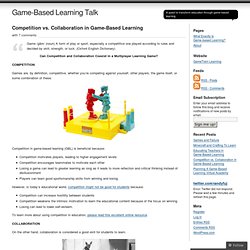
(Oxford English Dictionary) Can Competition and Collaboration Coexist in a Multiplayer Learning Game? Games are, by definition, competitive, whether you’re competing against yourself, other players, the game itself, or some combination of these. Competition in game-based learning (GBL) is beneficial because: Competition motivates players, leading to higher engagement levelsCompetition encourages teammates to motivate each otherLosing a game can lead to greater learning as long as it leads to more reflection and critical thinking instead of disillusionmentPlayers can learn good sportsmanship skills from winning and losing. However, in today’s educational world, competition might not be good for students because: To learn more about using competition in education, please read this excellent online resource. Some of the benefits of collaboration include: Games Directory / Home - IMAGINE Games - Game-based Learning. Podstawowe założenia pedagogiczne Janusza Korczaka, Marii Montessori i Celestina Freineta.
Dabrowski - Dabrowski's Overexcitabilities in Gifted Children. Does your child complain about the seams in his socks? Put her hands over her ears when the movie starts in the movie theater? Elts annual review - Google Scholar. 45 Interesting Ways to use your Pocket Video Camera in the classr. Mindstorming - how to mindstorm with the 20-ideas method of solo brainstorming. Brian Tracy on Success. The Share Guide: We are focusing this issue on Self-Actualization.
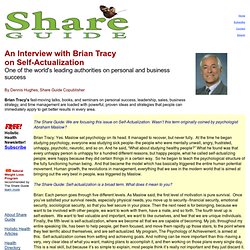
Wasn’t this term originally coined by psychologist Abraham Maslow? Brian Tracy: Yes. Maslow set psychology on its head. It managed to recover, but never fully. At the time he began studying psychology, everyone was studying sick people--the people who were mentally unwell, angry, frustrated, unhappy, psychotic, neurotic, and so on. The Share Guide: Self-actualization is a broad term.
Brian: Each person goes through five different levels. The Share Guide: So setting goals is the practical step toward grounding the vision into action? Mindstorming. Mindstorming, sometimes called prospecting or the “20-idea method” sets the stage for letting your creative juices call forth suggestions for your writing as well as ways to improve your fortune and productivity.
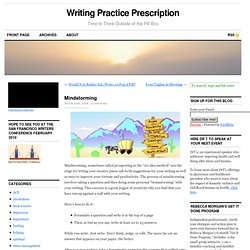
The process of mindstorming involves taking a question and then doing some personal “brainstorming” with your writing. Mind storming: the 20 idea method. Ads by Smithfam.com Mind Storming - The 20 Idea Method By Larry Hill You have tremendous creative abilities.

Dream incubation. Dream incubation is a practiced technique of learning to "plant a seed" in the mind, in order for a specific dream topic to occur, either for recreation or to attempt to solve a problem.
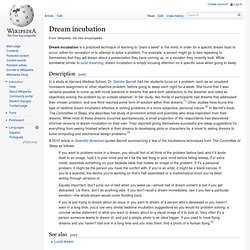
For example, a person might go to bed repeating to themselves that they will dream about a presentation they have coming up, or a vacation they recently took. While somewhat similar to lucid dreaming, dream incubation is simply focusing attention on a specific issue when going to sleep. Description[edit] In a study at Harvard Medical School, Dr.
Deirdre Barrett had her students focus on a problem, such as an unsolved homework assignment or other objective problem, before going to sleep each night for a week. A 2010 article in Scientific American quotes Barrett summarizing a few of the incubations techniques from The Committee of Sleep as follows: Benefits of Dream Interpretation. Step 1 As you are going to sleep see in your mind as clearly as possible the problem you are facing.
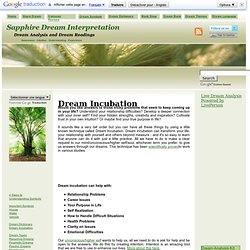
See the people involved, the feelings involved - yours and others (if you are aware of them) and the situation as it stands currently. Don't judge it or get embroiled in thinking about it, just view it. How to Program Your Dreams In Advance. A technique called dream incubation is the perfect approach to use whenever you would like to dream about a specific person, place, thing, or event. It also can be a useful method of getting in touch with your subconscious to find answers. Dream incubation requires that you predetermine what you will dream about and then set your intent to dream with full conscious awareness about that particular thing.
It is essentially a way of programming your dreams in advance. Teoria inteligencji wielorakich (MI) i zintegrowane nauczanie przedmiotowo-językowe (CLIL) w nauczaniu języka obcego małych dzieci - Uniwersytet Warszawski. 1.
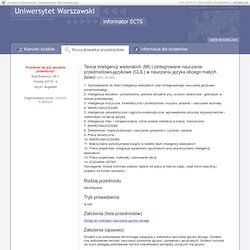
Wprowadzenie do teorii inteligencji wielorakich oraz zintegrowanego nauczania językowo-przedmiotowego.2. Languages - Quick Fix - Essential phrases in 40 languages. BBC Education - Languages. Clil_pl.pdf (Obiekt application/pdf) Tworzenie materiałów dydaktycznych dla zintegrowanego nauczania przedmiotowo-językowego (typu CLIL) - Uniwersytet Warszawski. 1.
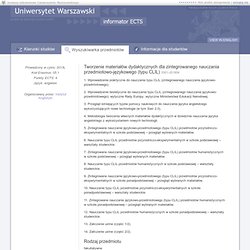
The Partnership for 21st Century Skills - Home. Group conversations around images, documents, and videos. 4learning.com. Powerful Voices for Kids - Giving students voice through media literacy. An online community for friends of PVK. Join us and share ideas as we build a community education movement!
EXPERIENTIAL_LEARNING.pdf (Obiekt application/pdf) Fenwick4.pdf (Obiekt application/pdf) Itin_JEE_1999.pdf (Obiekt application/pdf) CLIL Teachers´ Web Guide. To teach English is human, to teach CLIL is divine? « Jeremy Harmer's Blog. When Lindsay Clandfield gave his talk at the International House World Organisation Director of Studies’ conference (try saying all that quickly) in early January his title was ‘Coursebooks: what’s hot and what’s not’.

There was one thing Lindsay didn’t mention, and that was CLIL – or, as you all know by now, Content and Language Integrated Learning. So I got to wondering . Tertiary Place: The Tertiary Week of English. _report_teachers_professional_development_en.pdf (Obiekt application/pdf) Pedagogika Janusza Korczaka. Janusz Korczak- lekarz, pisarz, pedagog, moralista i działacz społeczny, pochodził z zasymilowanej rodziny żydowskiej, związanej z ruchem haskali. W latach 1989-1905 studiował medycynę w Warszawie, w 1907 r. w Berlinie, a w 1909 r. w Paryżu. Należał do kręgu podstawowej inteligencji warszawskiej przełomu XIX i XX wieku. Procesy poznawcze. Procesy poznawcze – procesy tworzące i modyfikujące struktury poznawcze (reprezentacje umysłowe) w systemie poznawczym (w umyśle), będące przedmiotem badań kognitywistyki i psychologii poznawczej.
Można stwierdzić, że procesy poznawcze służą do tworzenia i modyfikowania wiedzy o otoczeniu, kształtującej zachowanie (służą poznawaniu otoczenia). Można również stwierdzić, że są to procesy przetwarzania informacji, jakie zachodzą w układzie nerwowym i polegają na odbieraniu informacji z otoczenia, ich przechowywaniu i przekształcaniu, oraz wyprowadzaniu ich ponownie do otoczenia w postaci reakcji – zachowania. Mapa kultury.